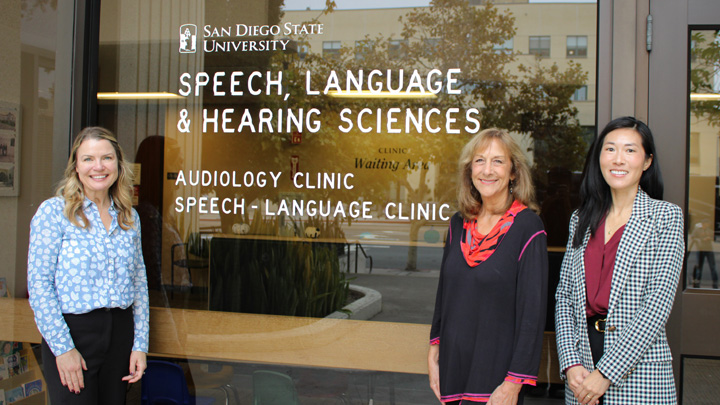COE, CHHS team up to better support children with autism

Traditionally in academia, special educators and speech language pathologists (SLPs) complete pre-professional training separately in distinct programs, departments and colleges. School-based teams that support young children with autism and other disabilities, on the other hand, are much more interdisciplinary — and by necessity.
“An individualized education program requires collaboration from multiple people within a school or early childhood setting,” explains Jessica Suhrheinrich, professor in special education at San Diego State University. “That includes speech-language pathologists, teachers, school psychologists, administrators and family members.”
In recent years, faculty from SDSU’s Department of Special Education and School of Speech, Language and Hearing Sciences have been working across campus to break down barriers and develop cross-campus curriculum innovations — efforts that received a major boost this fall thanks to a five-year $1.25 million grant from the U.S. Department of Education’s Office of Special Education Programs (OSEP).
The funding will support Project INCLUDE, an initiative to co-train 12 master’s students in early childhood special education and 12 in speech-language pathology to provide collaborative, evidence-based and neurodiversity-affirming services to young autistic children with high-intensity needs and their families. Scholars will receive support for tuition and fees, school supplies and educational expenses, and conference travel.
Suhrheinrich serves as principal investigator (PI) on the grant, working alongside Teresa Girolamo, Assistant Professor in Speech, Language and Hearing Sciences from the College of Health and Human Services, as well as Assistant Professor Melina Melgarejo and Professor Laura Hall from the Department of Special Education.
The work builds on Project MAINSAIL, a previous grant led by Associate Professor Yasemin Turan Qian, Hall and Professor and Interim Vice Provost Sonja Pruitt-Lord that initially brought the two departments together.
“This work didn’t come from nowhere and the impact should not be one-off,” Girolamo said. “So much of what we’re doing will live on after the life of the grant. Jessica, Laura, Melina and others have been really gracious in building a community across campus around topics related to autism, neurodiversity and service delivery.
“The College of Education has been very forward-thinking in terms of building the community that we want to have, not just here on campus, but professionally within the allied health professions and special education.”
Addressing high turnover
The collaborative approach will allow practitioners in both disciplines to build on each others’ experience and knowledge while building community. The idea is that stronger connections and a broader understanding of their respective roles will set them up for success in professions often long beset by shortages and turnover.
A former special education teacher in New York City Public Schools who now prepares SLPs, Girolamo has seen it from both sides. She said SLPs have remarkably high burnout rates — something she hopes co-training can help address.
“SLPs can feel overwhelmed, stressed, or like they don’t have a community,” she said. “This collaboration will help support sustainability. We want to graduate professionals who will stay in this career and have a widespread impact by directly working with students, working with other professionals, and working with families.”
Suhrheinrich said special education teachers face similar challenges, and the profession is subject to similar churn.
“There’s an incredible shortage of special educators in Southern California and nationally,” she said. “So this funding will help us directly address that need by providing the tuition fees and stipend to recruit people into the field.”
Neurodiversity-affirming practices
Project INCLUDE is now focused on recruiting graduate scholars, focusing on aspiring SLPs (a master’s degree is required to enter the profession) as well as early-career special education teachers interested in learning more about autism.
Those selected will receive a mix of coursework, clinical and practicum experiences and a culminating project — all of it highly collaborative. The curriculum will be grounded in neurodiversity-affirming practices, which treat differences in how brains are wired and function as a form of diversity.
“We’re thinking about it as treating each student like a human being and treating their families with dignity, honor and respect,” Suhrheinrich said. “We want practitioners to support students for who they are, providing services to help them meet their goals without making judgments about their value or worth based on perceptions about disabilities.”
Scholars will also benefit from mentorship from an advisory committee made up of practitioners, family members and self-advocates.
“We’re going to develop a learning community and learning materials that support not just the scholars themselves, but also the broader campus community and beyond,” Girolamo said. “We’ll have a nice network where people can go to one another for support.”

